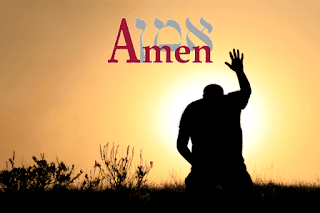Amen
The familiar last phrase of the Lord's Prayer is not in the earliest and best texts. It's also not in Luke's account of the prayer. Most likely, this phrase was added later as a liturgical ending (meaning it was using the worship liturgy of the early church) and then became part of the Biblical text. And while it may not (probably is not) original with Jesus, it certainly reflects both larger Biblical themes and the themes of the prayer we've already walked through.
There are three things this liturgical ending ascribes to God. First, the kingdom. We've seen this as part of the prayer in verse 10 (and talked about it here). It's God's kingdom we are most concerned with, not our own. This benediction reminds us of that once again.
Second, the power. This is a God of power we are dealing with—power to create and to destroy the world. Power to hear our prayers and respond. Power to save and even the power to respect a person's decision not to be saved. Gentle strength, great power. The other gods of the world claimed to have power, but they were mute idols. This God is living and active, powerful over all the world. We're not giving God power; we're recognizing that God is powerful.
Third, the glory. Psalm 29 puts it this way: "Ascribe to the Lord, you heavenly beings, ascribe to the Lord glory and strength. Ascribe to the Lord the glory due his name; worship the Lord in the splendor of his holiness" (29:1-2). That doesn't mean God has no glory if we don't "give" it to him. It means we recognize that God is glorious. Just as a sunrise is glorious and beautiful whether we say so or think so or not, God is glorious whether we recognize it or not. The prayer and the psalmist call us to recognize what is already true.
And how long are we supposed to do all of this? Forever. By the way, grammatically, "forever" applies to all three: kingdom, power and glory. A lot of times, we pray or recite the words as if only "glory" is forever. Listen to the way many people say it: "For thine is the kingdom...and the power...and the glory forever..." God doesn't just get glory forever. The kingdom is his...forever. The power is his...forever. And the glory is his...forever. All of it. For eternity. In this benediction, we recognize who God is and who God will be forever and ever.
Then we sign our name to it. "Amen" means "so be it." I had a parishioner once who, instead of saying "amen" would always end his prayers, "So be it." The word itself is a prayer, harkening back to the way Jesus taught us to pray for the kingdom to come: on earth as it is in heaven. Now as then. May the reality Jesus comes to bring start breaking through right now, right here. So be it. Let it be so.
Think back over the entire prayer now. This is really a radical prayer, a prayer that returns us to our roots and challenges us to move beyond what we think we know. Can we ever say it by rote again?



Comments
Post a Comment